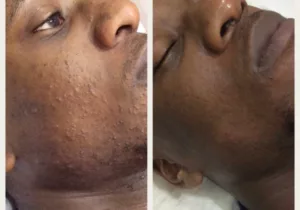Black Skin and the Importance of the Correct Skin Care
The Importance of Cleansing and Moisturising for Black Skin
Maintaining radiant and healthy skin transcends ethnicity, and for individuals with black skin, a dedicated skincare regime is key to achieving and preserving that natural glow. Proper cleansing and moisturising are two fundamental pillars of skincare that are particularly crucial for black skin due to its unique characteristics.
Cleansing Black Skin:
Effective cleansing of black skin will remove the dirt, excess oil and impurties which clog pores and lead to blemishes, spots, acne and uneven skin tone. Melanin is higher in black skin than other skin tones and therefore offers more protection against harmful UV rays. However, it also means it is prone to hyperpigmentation and dark spots, if daily skin cleansing is not undertaken. A gentle cleanser which include alpha hydroxy acids or salicyclic acid, helps to promote the cell turnover, decrease the chances of blocked pores and lessen the risk of uneven skin tone or pigmentation.
Moisturising Black Skin:
To maintain its suppleness and prevent dryness, it is imperative to moisurise black skin. Hydrated skin is more resilient, less prone to irritation, and better equipped to defend against external aggressors. Moisturisers containing humectants like glycerin and hyaluronic acid are ones that should be looked at closely, as they attract and retain moisture. Also moisturisers with antioxidants like vitamin C will help combat any oxidative stress and minimise any appearance of dark spots that may develop..
By following these two simple procedures in the morning and evening will contribute to a healthy skin barrier, will reduce the risk of scarring, and promote an even complexion.
Resource: The Black Skin Directory (https://blackskindirectory.com/)

The importance of Sunscreen and SPF for Black Skin
The importance of wearing a high sun protection (SPF) is paramount when it comes to maintaining great skin health and radiant skin for all skin tones. and protection from the sun’s harmful rays. Black skin is not immune to sun damage and black skin is equally susceptible to the detrimental effects of ultraviolet (UV) radiation. We cannot stress enough, the importance of a SPF, minimum 30) to use daily on black skin.
As mentioned, melanin, the pigment responsible for skin colour, does offer some sun protection, but it’s not an impenetrable shield. Prolonged sun exposure can, as mentioned previously, lead to hyperpigmentation and uneven skin tone, but there is also an increased risk of skin cancer. All of these aspects make the use of sun protection essential.
When looking for the best SPF to protect your skin, you should also consider an SPF that is also not detrimental to the skin in general. An SPF for black skin should allow the pores in your skin to breath and not clog up those pores. Blocking pores will create bacteria and may lead to blackheads and acne. The SPF products for black skin should also contain physical blockers like zinc oxide or titanium dioxide, as they provide effective protection without leaving a white cast.
British Skin Foundation – Sunscreen and Sun Safety
Potential problems of Hyperpigmentation and Hypopigmentation on Black Skin.
Hyperpigmentation and hypopigmentation on black skin can be influenced by various factors, including certain ingredients found in everyday skincare products that may be being used. Understanding these triggers and adopting targeted skin treatments for black skin, such as those offered by Skin Revision skin clinic in Buckinghamshire, can help prevent and address these concerns.
Beware of these ingredients:
- Hydroquinone: While effective for lightening dark spots, hydroquinone can lead to hypopigmentation, especially when used improperly or for extended periods.
- Benzoyl Peroxide: Overuse of this ingredient, often used within acne treatments, can cause post-inflammatory hyperpigmentation in black skin.
- Alpha Hydroxy Acids (AHAs): High concentrations and inadequate sun protection when using AHAs, like glycolic acid, can trigger hyperpigmentation.
- Retinoids: Without proper guidance from a black skin expert, retinoids can exacerbate pigmentation issues and cause irritation in black skin.

Preventive and resolving skin treatments should contain these:
- Vitamin C: Vitamin C is a wonderful antioxidant which brightens skin and helps fade hyperpigmentation.
- Niacinamide: This is a multitasking ingredient that regulates pigment production This makes it effective for both hyperpigmentation and hypopigmentation on black skin.
- Licorice Root Extract: Containing glabridin, it helps inhibit tyrosinase, an enzyme involved in melanin production. Perfect within a black skin treatment plan.
- Sunscreen: Daily broad-spectrum SPF protection as mentioned previously.
Typical skin treatments to prevent hyperpigmentation and hypopigmentation on black skin :
- Chemical Peels: Superficial peels with glycolic acid or salicylic acid can improve hyperpigmentation.
- DMK Skin Revision: Paramedical skin treatments designed for black skin
- Microneedling: This collagen-stimulating treatment can help with hyperpigmentation
- CryoPen Cryotherapy: Intense freezing of Hyperpigmenation on black skin
American Academy of Dermatology – Skin of Color (https://www.aad.org/skinofcolor)
Combining cautious ingredient selection, preventive skincare, and professional interventions can significantly diminish the impact of hyperpigmentation and hypopigmentation on black skin.
![]()
Banishing acne and spots in black skin
Achieving a blemish-free complexion is a desire of everybody, and this holds true for black skin as well. While acne and spots can affect all skin types, individuals with black skin may encounter unique challenges. Tailored skincare strategies can help minimize or even prevent acne and spots on black skin.
Gentle Cleansing: Start with a mild, sulfate-free cleanser to avoid stripping the skin of its natural oils. Over-cleansing can trigger excess oil production, leading to breakouts (see information, earlier in the article)
Non-Comedogenic Products: Opt for non-comedogenic moisturisers and sunscreens to prevent clogged pores, a common precursor to acne (see information, earlier in the article)
Salicylic Acid: Incorporate products containing salicylic acid to exfoliate the skin and unclog pores, addressing both existing acne and potential breakouts.
Hydration: Proper hydration maintains the skin’s natural barrier, preventing overproduction of oil that can contribute to acne. Consider lightweight, oil-free moisturisers. Drink plenty of water, daily.
Sun Protection: Daily application of a broad-spectrum, minimum SPF 30 sunscreen, is vital. Sun exposure can worsen post-acne marks and lead to uneven skin tone.
Avoid Picking: Picking at acne can exacerbate inflammation and increase the risk of dark spots or scarring, especially in black skin.
Professional Care: Consult a acne skin specialist that understands the best care and treatment for acne. Chemical Peels, Microneedling, Hydra Facials and LED light therapy are just great ways to help prevent acne. DMK Skin Revision programme is one of the finest ways to resolve acne on black skin.
![]()
A nutrient-rich diet for optimal skin health in black skin
Achieving and maintaining exceptional skin health extends beyond topical treatments; it begins from within. Embracing a balanced and nutrient-rich diet can significantly enhance the natural beauty of black skin.
Vitamins and Minerals: In your daily intake of food and drink, incorporate foods rich in vitamins A, C, and E, along with minerals like zinc and selenium, can promote collagen production, protect against oxidative stress, and support overall skin health.
Antioxidant-Rich Foods: Berries, citrus fruits, leafy greens, and nuts are packed with antioxidants that combat free radicals, aiding in the prevention of premature ageing and maintaining skin’s glow and health.
Omega-3 Fatty Acids: Consuming sources like fatty fish, flaxseeds, and walnuts helps bolster skin’s natural barrier, reduce inflammation, and keep it supple and hydrated.
Hydration: Drinking ample water keeps the skin hydrated, promoting elasticity and a radiant complexion. Herbal teas and infused water can add variety to your hydration routine.
Limit Processed Foods: Reducing refined sugars, excessive salt, and processed foods can help prevent inflammation, which is linked to skin issues such as acne and uneven tone.
Resource: NHS – Eat Well Guide (https://www.nhs.uk/live-well/eat-well/the-eatwell-guide/)
Elevating your skin health through a wholesome diet is a holistic approach that compliments your skincare regime. By nourishing your body with the right nutrients, you empower black skin to thrive, revealing its innate radiance and vitality.
Summary
Establishing a good skin care routine, avoiding or protecting against the sun, eating and drinking correctly within your daily diet and understanding the causes of acne, hyperpigmentation and hypopigmentation, can help keep black skin brighter, tighter, firmer, clearer and more radiant.
For any advice on the best ways to look after black skin, maintain great black skin health or treat in-clinic, black skin, then contact one of the most reputable skin clinics for black skin.



